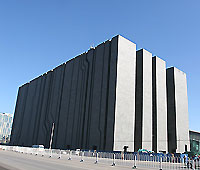Beijing's first government data pool and emergency command center has commenced operations.

The Digital Beijing Building [BOCOG] |
The center will operate during and after the Olympics.
The Digital Beijing Building, located a few hundred meters northwest of the National Stadium, the main stadium for the Games, will be the central powerhouse of all statistical, visual and audio information from all 37 venues nationwide during the Olympics.
The center will be able to receive live images from spectator stands at all venues, sources told China Daily.
The center, 11 storeys high and two levels below ground, will continue to be the government's command headquarters in the event of an emergency after the Games.
"Here we have access to the cell phone network, the land phone network, the government's network and the police network, either cable or wireless networks. That's why we are able to respond as the command headquarters in times of an emergency," an official from the municipality's IT office, who requested anonymity, said.
"Because we have been working with five telecom and Internet service providers, we are basically a telecom headquarters."
Experts said that with such a network, the city would be able to track phone and Internet communications in the event of a terrorist attack.
"Unlike the US where reportedly 100 percent of phone communications and 80 percent of Web communications are monitored, our country has not obtained advanced technologies like that," said Liu Jianwei, an electronics information expert from Beijing-based Beihang University.
"At the moment, problems like web communication filtering have not been solved. But I believe both citizens and the technical personnel should conduct themselves under the framework of the law."
What's in a name is more than just the Games
The Beijing Olympics has become so embedded in the national psyche that nearly 3,500 children have been named after the Games by their parents, a newspaper reported Sunday.
Most of the 3,491 people with the name "Aoyun," meaning Olympics, were born around the year 2000, when Beijing was bidding to host the 2008 Summer Games, the Beijing Daily reported, citing information from China's national identity card database.
The vast majority of people named Aoyun are male, the newspaper said. Only six live in Beijing, though the report didn't say where the others live.
Names related to the Olympics don't just stop with "Olympics." More than 4,000 Chinese share their names with the Beijing Games mascots, the Fuwa.
The names are Bei Bei (880 people), Jing Jing (1,240), Huan Huan (1,063), Ying Ying (624) and Ni Ni (642). When put together, the phrase translates to "Beijing welcomes you!"
Chinese have increasingly turned to unique names as a way to express a child's individuality.
In a country with a population of 1.3 billion, 87 percent share the same 129 family names. That's why 5,598 people have the same name as basketball player Yao Ming and 18,462 share a moniker with star hurdler Liu Xiang, according to the Beijing Daily report.